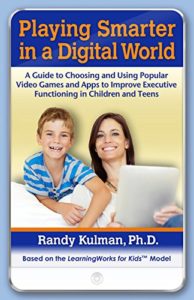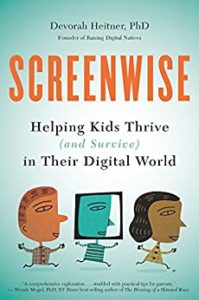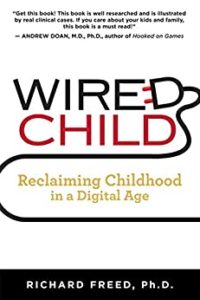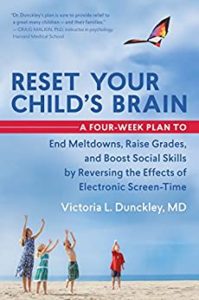Audiobooks for Parenting on Screen Time
With today’s modern technology, it is quite easy to fall victim to our screens. Our children are constantly engaged with screens at home and in school and always seem to be on computers or tablets or watching television. Our society has become dependant on these screens in order to function effectively. But how much screen time is too much, and how can we set boundaries for our kids? Fortunately, we have compiled the most relevant resources available to share with you on how to set appropriate limits on screen time. We know how hectic the life of a parent can be, so all of the following resources are in audiobook format. You can listen in the car, while you are working out or when cooking dinner. It’s a great way to learn more about screen time and the most effective parenting strategies to help our children succeed.
Our team of neuropsychologists, school psychologists, and psychology students at South County Child and Family Consultants is committed to searching the Internet and beyond to find reputable, informative, and practical tools to help parents, children, and teens. We look for the best information online to help kids diagnosed with ADHD, Learning Disabilities, executive-functioning difficulties, struggles with Social Emotional Learning (SEL) skills, autism, depression, and anxiety, among others, and provide you with information about how neuropsychological evaluations can help in targeting these concerns. Come back regularly, as the links are updated frequently with the most up-to-date resources available.
Playing Smarter in a Digital World: A Guide to Choosing and Using Popular Video Games and Apps to Improve Executive Functioning in Children and Teens by Randy Kulman, Ph.D.

A book to help parents to make their children’s digital playtime educational.
Digital play, when used appropriately, can be a powerful tool for learning skills such as planning, time management, cooperation, creativity, and digital literacy. The book’s clearly articulated strategies help parents use digital media in a more effective manner and, at the same time, set effective limits and implement a healthy “play diet” for their children. A section devoted to exploring specific strategies for using digital media with children in specific populations—such as children affected by ADHD, autism spectrum and learning disorders, and other mental health and educational issues—is also featured, as is a list of specific games, apps, and tools to make game-based learning most effective.
Dr. Kulman’s take: My favorite book. I wrote it! I am a big believer that screens are here to stay, are an important part of the lives of our kids, and provide opportunities for learning academics and life skills-but all too often take time away from other vital activities. I describe my concept of a healthy and balanced “Play Diet”, that documents the importance of physical, social, creative, and unstructured play to go along with screen-based digital play.
Screenwise: Helping Kids Thrive (and Survive) in Their Digital World by Devorah Heitner, Ph.D

Screenwise offers a realistic and optimistic perspective on how to thoughtfully guide kids in the digital age. Many parents feel that their kids are addicted, detached, or distracted because of their digital devices. Media expert Devorah Heitner, however, believes that technology offers huge potential to our children-if parents help them. Using the foundation of their own values and experiences, parents and educators can learn about the digital world to help set kids up for a lifetime of success in a world fueled by technology. (From Amazon.com audiobook review)
Dr. Kulman’s take: A thoughtful approach to screen time. Encourages parents to become more involved with their children’s technology use.
Wired Child: Reclaiming Childhood in a Digital Age by Richard Freed, Ph.D

Wired Child gives you the confidence and skills you need to safely navigate your children through a rapidly shifting media landscape. Dr. Freed offers concrete parenting strategies that will help you create the strong family kids need and encourage their school success. You’ll also learn how to protect kids from destructive tech addictions, and instead, guide them to use technology productively as a positive force for their future. (From Amazon.com audiobook review)
Dr. Kulman’s take: Wired Child helps parents to recognize that they can’t just leave their kids to their devices. Parents need to be involved and Dr. Free offers pragmatic strategies to do so.
Reset Your Child’s Brain: A Four-Week Plan to End Meltdowns, Raise Grades, and Boost Social Skills by Reversing the Effects of Electronic Screen-Time by Victoria L. Dunckley, MD

Offered now in this book, this simple intervention can produce a life-changing shift in brain function and help your child get back on track — all without cost or medication. While no one in today’s connected world can completely shun electronic stimuli, Dr. Dunckley provides hope for parents who feel that their child has been misdiagnosed or inappropriately medicated, by presenting an alternative explanation for their child’s difficulties and a concrete plan for treating them. (From Amazon.com audiobook review)
Dr. Kulman’s take: Dr. Dunckley takes a hard-line view of the dangers of technology. She has found that removing technology form the lives of some kids has been the key to resolving psychiatric issues. She describes Electronic Screen Syndrome as an explanation for some behavioral and emotional disturbances that are not impacted by traditional treatments.